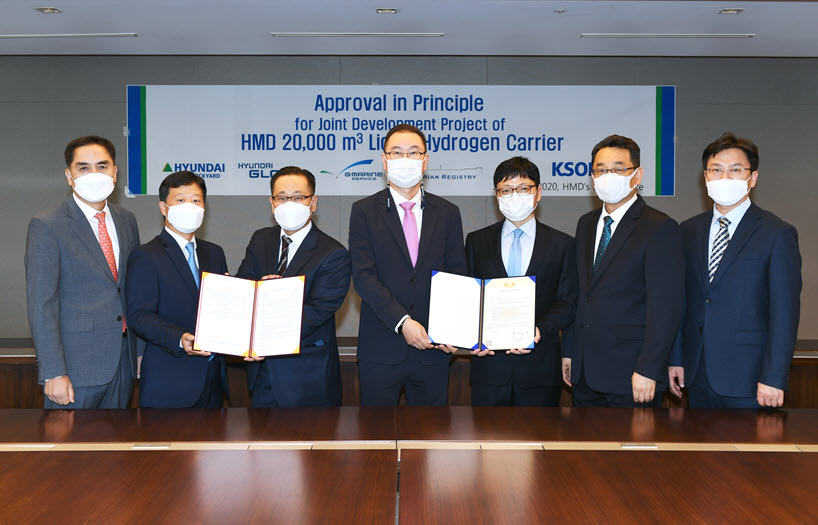
Hyundai Heavy Industries Group obtains approval from the Class society Korean Register for the Hyundai Mipo Dockyard’s design plans for a 20,000 cu m liquefied hydrogen carrier

Hyundai Glovis, a global SCM specialized company, took the first step in developing a large-sized liquid hydrogen carrier in cooperation with a domestic shipbuilder.
The basic design drawing of a 20,000㎥-class commercial liquefied hydrogen carrier developed jointly by Hyundai Glovis with Korea Shipbuilding & Marine Engineering and Hyundai Mipo Shipbuilding has obtained the basic certification (AIP, Approval in Principle) from the Korean Register of Shipping and Liberia flag states for the first time in the world.
This is the first case of joint development of a hydrogen carrier with a national carrier, and it is of great significance that domestic shipping and shipbuilders have operated a cooperation system to preoccupy the global hydrogen maritime transportation market.
Basic certification refers to a procedure in which design drawings in the early stages of ship development are recognized for safety and effectiveness from official certification agencies at home and abroad. It has been approved for the basic steps necessary for shipbuilding, and is expected to become a technical standard in the design process to follow. The Korean Register of Shipping, which is a domestic ship certification body, and the Liberian flag state, which is an overseas ship registration agency, are recognized as international standards in the area of ship drawing approval.
At the AIP Ceremony held at the Korea Shipbuilding & Marine Engineering office in Gye-dong, Jongno-gu, Seoul, 20 people from six companies including Hyundai Glovis, Korea Shipbuilding & Marine Engineering, Hyundai Mipo Shipbuilding, Korea Register of Shipping, Liberia Flag State, and Gmarine Service attended 20,000㎥. Congratulations on the acquisition of the basic certification for class liquefied hydrogen carriers.
In May, Hyundai Glovis began a basic design for joint development of a hydrogen carrier with Korea Shipbuilding & Marine Engineering and Hyundai Mipo Shipbuilding. The background of the launch was that the combination of Hyundai Heavy Industries Group’s shipbuilding technology, Hyundai Glovis’ historical flight data, and the hydrogen supply chain management platform that was in progress at the time would create great synergy.
In fact, Hyundai Glovis derived various factors that could affect the safety of hydrogen carriers, such as the size of the ship, the engine driving method, and the hydrogen gas treatment method, along with G Marine Service, a subsidiary of ship management, and reflected in the design. In addition, the economic feasibility review was conducted by comprehensively calculating the investment amount and operating cost for shipbuilding.
Korea Offshore & Shipbuilding has developed a liquefied hydrogen cargo treatment system and a hydrogen evaporative gas treatment system using fuel cells, and Hyundai Mipo Shipbuilding has advanced the ship’s basic design.
In order to transport a large amount of hydrogen by ship, a liquefaction process that reduces the volume and increases safety is essential. Liquefied hydrogen has a volume of 1/800 compared to hydrogen gas, making storage and transportation much easier and more economical. Compared to the method of compressing to contain more gaseous hydrogen, it is safer than the method of compressing, which is very advantageous in securing business potential.
Hyundai Glovis is a strategy to secure hydrogen maritime transportation competitiveness in the future based on the experience of participating as a shipping company in the joint development of hydrogen carriers and directly verifying the economy and safety. In particular, it is expected that if Korea’s leading shipping companies and shipbuilders collaborate to create technology standards, they will be able to gain an edge in the future global hydrogen maritime transport leadership competition.
Meanwhile, prior to the announcement of participation in this development, Hyundai Glovis signed a MOU for joint response to changes in the shipping environment’ with’Wilh. Wilhelmsen Holdings ASA’, a leading European shipping company, last month. The plan is to create a synergy in the hydrogen maritime transportation business when the development of a liquefied hydrogen carrier is completed in a preemptive relationship with Wilhelmsen, a top-class shipping company in the field of gas ship safety management.
Hyundai Glovis will ensure that the shipping and shipbuilding industries are equipped with core transport capabilities in the process of building offshore hydrogen supply infrastructure through the joint development of liquefied hydrogen carriers, and plans to further strengthen cooperation with the shipbuilding industry to enhance the competitiveness of hydrogen marine transport.
Read the most up to date Fuel Cell and Hydrogen Industry news at FuelCellsWorks




